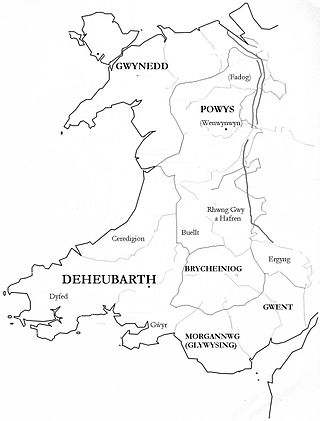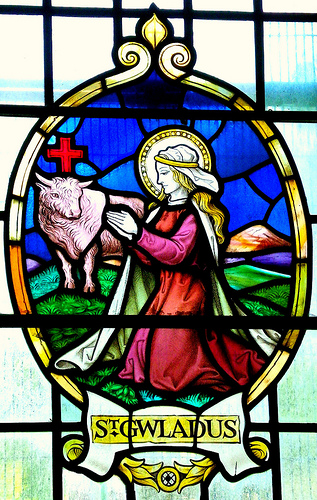
Deheubarth was a regional name for the realms of south Wales, particularly as opposed to Gwynedd. It is now used as a shorthand for the various realms united under the House of Dinefwr, but that Deheubarth itself was not considered a proper kingdom on the model of Gwynedd, Powys, or Dyfed is shown by its rendering in Latin as dextralis pars or as Britonnes dexterales and not as a named land. In the oldest British writers, Deheubarth was used for all of modern Wales to distinguish it from Hen Ogledd, the northern lands whence Cunedda originated.

Ceredig ap Cunedda, was king of Ceredigion in Wales.

Wenna was a medieval princess and Christian martyr who flourished in Wales and Cornwall. Later venerated as a saint, she is honored at multiple churches in Cornwall and Devon.

Saint Tydfil is the legendary dedicatee of Merthyr Tydfil, Wales. The old parish church of St Tydfil, Merthyr Tydfil, is dedicated to her and is reputed to be the site of her death.

Brychan Brycheiniog was a legendary 5th-century king of Brycheiniog in Mid Wales.

Saint Eluned, also known as Aled and by other names, was a 5th- or 6th-century virgin martyr from the area of modern Breconshire. George Phillips, writing for the Catholic Encyclopedia, calls her "the Luned of the Mabinogion and the Lynette of Tennyson's Gareth and Lynette.".

Brycheiniog was an independent kingdom in South Wales in the Early Middle Ages. It allied with the Mercian kingdom in the post Roman era, to stabilise and control a central (Marches) area key to dominance over central Proto-England to the east and the south Welsh kingdom of Deheubarth to the west. It was conquered and pacified by the Armorican Normans between 1088 and 1095, though it remained Welsh in character. It was transformed into the Lordship of Brecknock and later formed the southern and larger part of the historic county of Brecknockshire. To its south was the Kingdom of Morgannwg.
Rhain ap Cadwgan was an 8th-century king of Dyfed and Brycheiniog in Wales of the Early Middle Ages. He succeeded his father Cadwgan, who succeeded his father Caten ap Cloten.

Mabyn, also known as Mabena, Mabon, etc., was a medieval Cornish saint. According to local Cornish tradition she was one of the many children of Brychan, king of Brycheiniog in Wales in the 5th century. The village and civil parish of St Mabyn is named for her, and the local St Mabyn Parish Church is dedicated to her.

Dingad or Dingat was a late 5th century Welsh saint and early Christian church founder.

Gwynllyw Filwr or Gwynllyw Farfog, known in English in a corrupted form as Woolos the Warrior or Woolos the Bearded was a Welsh king and religious figure.

Saint Gwladys ferch Brychan or St Gladys, daughter of King Brychan of Brycheiniog, was the queen of the saint-king Gwynllyw Milwr and the mother of Cadoc "the Wise", whose Vita may be the earliest saint's life to mention Arthur. Gwladys's other children were Cynidr, Bugi, Cyfyw, Maches, Glywys II and Egwine. Today her main church and associated school is in Bargoed.

Afan of Builth was an early 6th-century Welsh bishop, martyr, and saint. His feast day is generally placed on 17 November, although the Demetian Calendar formerly used in southern Wales placed it on the 16th; it is no longer observed by either the Anglican or Catholic church in Wales.

Saint Enodoc, originally Wenedoc, was a sub-Roman Pre-congregational saint of Cornwall.

Saint Enoder, was a 5th-century Cornish saint from Brecknockshire in South Wales. He is venerated in the Anglican and Roman Catholic Churches.
Queen Rigrawst was one of the queens consort of King Brychan Brycheiniog, the legendary 5th-century king of Brycheiniog (Breconshire) in South Wales.
Clydog was a sixth-century Welsh king of Ergyng who became a saint. His feast day is traditionally held on 3 November but is also celebrated on 19 August.
Cynyr Ceinfarfog was a ruler of the Kingdom of Dyfed in Wales. He was known as Cunoricus in Latin and in English as Kendrick or as Cynyr the Red.
Saint Dogmael was a 6th-century Welsh monk and preacher who is considered a saint. His feast day is 14 June.
Saint Bilo was a 5th century saint and one of the 24 daughters of Brychan Brycheiniog. She founded a church in Llanfilo, which is now a village in the community of Felin-fach in Powys.












